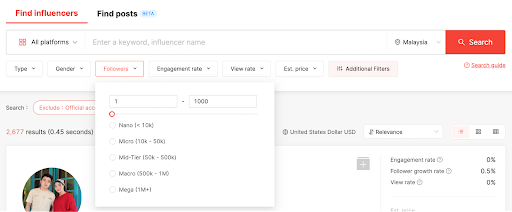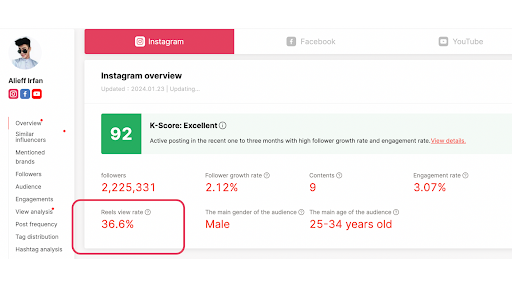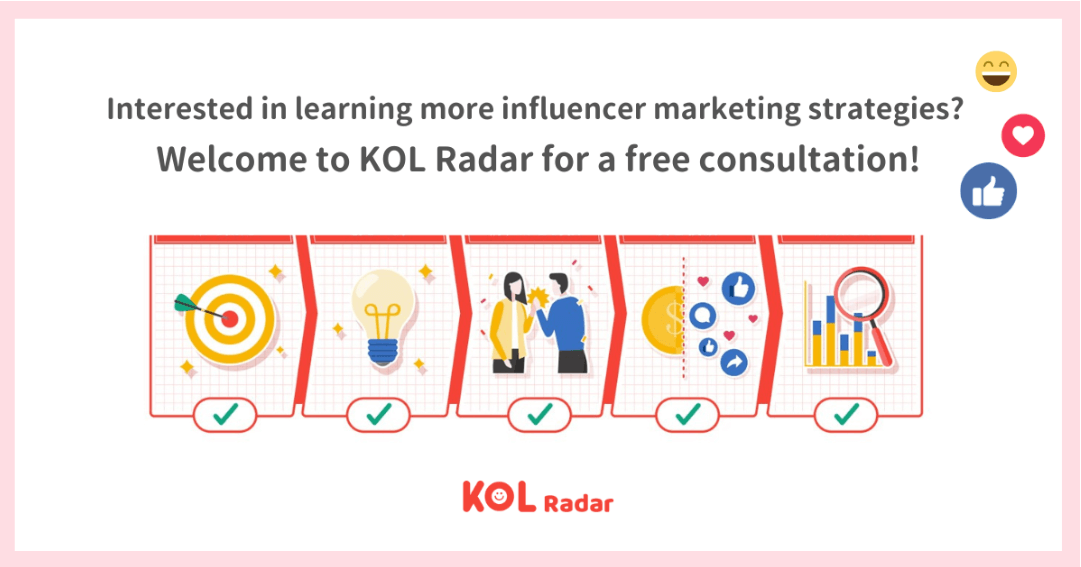Discover Influencers Precisely in Only 30 Seconds!
As influencer marketing continues to mature, brands are not only leveraging influencers to quickly expand their social community reach but also to strategically plan for long-term sales conversion.
KOL Radar harnesses AI to comprehensively evolve the influencer marketing database. It has upgraded its retrieval capabilities and video shopping trends, including features such as “Downgrade influencers follower count filtering” that increases opportunities for nano-influencers/KOC to be discovered, “Keyword sorting,” “Influencer audience filter,” “Custom export of data from the influencer library,” “Composite search function,” “Tabular view of my collection data,” and “Inclusion of IGTV view counts.” These features can assist you in effectively utilizing the vast data in the influencer marketing database, helping you to achieve significant success in capturing the online market post-pandemic.
Enlisting Nano Influencers/KOCs with Less Than a Thousand Followers at Once
Nano influencers/KOCs refer to individuals with a follower count below 10,000. They are often considered amateur influencers. According to KOL Radar’s statistics, individuals with fewer than 10,000 followers enjoy substantial traffic benefits on major social platforms. They possess high persuasiveness and can communicate with target audiences precisely, serving as influential references for consumers before making purchases.
However, due to the low entry barrier for becoming a nano influencer/KOC, it is challenging and time-consuming for brands to identify individuals who align with their product niche and exhibit impressive social media performance within the vast sea of potential candidates. To address this challenge and alleviate the time and effort brands would need to invest, KOL Radar has lowered the searchable follower count threshold in the influencer database to below 1,000. This helps brands efficiently enlist a large number of nano influencers at once.

Keyword Sorting to Identify Expert Influencers for Brand Shopping Guidance:
KOL Radar has introduced the “Keyword Sorting” feature in its exclusive influencer database, allowing for search results to be sorted based on the “frequency of mentioned keywords” in the influencers’ social media posts. By analyzing the frequency of keywords appearing in influencers’ posts, this feature helps brands quickly identify brand advocates, expert shopping guides, or suitable KOC candidates.
For instance, in the search for mid-sized parenting influencers with a follower range of 100,000 to 300,000, advertisers can simply enter shopping-related keywords like “group purchase” in the search bar, select “parenting” in the category, set data thresholds based on influencer marketing objectives, and then choose to sort the results based on “keywords.” This enables brands to find influencers with excellent social media performance and extensive shopping guidance experience who align with the specified criteria.

In addition, since the data for “Keyword Sorting” in the KOL Radar influencer database is derived from over 80,000 influencer profiles and their associated social media posts, you can use keywords to amass a collection of influencers. Also, you can input brand names and product category names to discover brand enthusiasts and nano influencers within specific product categories. You can even conduct a comprehensive competitive analysis within the influencer marketing landscape.
Comprehensive Evolution of the Search Engine: Precision in Keyword Targeting
KOL Radar’s search functionality has undergone a comprehensive evolution to align with its users’ search intentions. Brand advertisers can utilize exact matching (” “), union ( ), and intersection (AND) to more efficiently and quickly filter out target individuals for influencer marketing projects from a database of over 80,000 influencers.
To ensure precise keyword searching, when keywords include spaces or punctuation, brand advertisers can use the “exact matching” search feature. By inputting the “target keyword” (enclosing the keyword in double quotation marks) in the search bar, a precise search is conducted. The search engine will retrieve results that match the “target keyword” exactly.
For instance, when searching for the well-known food delivery brand “Uber Eats” on KOL Radar, using “exact matching” with “Uber Eats” is necessary to precisely retrieve results matching the brand name. Without using “exact matching,” the spaces between “Uber” and “Eats” would result in a “union search,” which would return all results containing both “Uber” and “Eats” respectively.

When it comes to searching for influencers who align with specific marketing goals and specific categories, brand advertisers can utilize the “intersection” (AND) function. By entering “group purchase AND olive oil” in the search bar, you can find influencers who are experienced in promoting products and have mentioned “olive oil” in their social media posts.
On the other hand, “union,” as opposed to “intersection,” retrieves all content that matches any of the specified keywords. For instance, by entering “group purchase OR cushion foundation” or “group purchase cushion foundation” (with keywords separated by a space), users can search for all results related to “group purchase” and “cushion foundation.” This function is suitable for broad searches where the intent is to retrieve a wide range of content related to “specific product categories” and “keywords for marketing purposes.”

Furthermore, KOL Radar’s full-text keyword search also includes advanced search features such as “exclude” and “grouping.” For example, if a facial mask brand wishes to find influencers who have mentioned their product or their competitors’ product, they can use the “grouping” feature (using curly braces { } to group keywords) and set conditions in the search bar like “facial mask AND {brand OR competitor}.” This allows them to search for all influencers who have mentioned either “the brand’s facial mask” or “competitor’s facial mask” in one go.
The “exclude” feature helps brands filter out specific keywords (connecting keywords with a minus sign “-“). For instance, entering “smartphone – brand name” will retrieve influencers who mention “smartphone” but exclude those who simultaneously mention a specific brand. The “exclude” feature is useful for excluding influencers who have mentioned competitors’ products.

Custom Data Export for Efficient Analysis of the Best Influencer Candidate
To assist brands in efficiently filtering data and selecting suitable influencers, KOL Radar has introduced the “Custom Data Export” feature in the “Influencer Collection.” You can select the necessary items such as social media platforms, data timestamp, influencer’s basic information, and social data and export them as an xlsx file. This saves valuable time that may be wasted on combing through additional data. It enhances the process of interpreting influencer data and increases the efficiency in selecting collaboration partners.

Comprehensive Data Overview of My Collection: Evaluating the Overall Performance of Influencers
With the rapid growth in the number of nano influencers in recent years, it has become challenging to observe each individual in the Influencer Collection. To address this, KOL Radar has introduced the “Tabular View” feature in “My Collection.” This function allows brand advertisers to have a comprehensive overview of real-time social media data performance for all influencers in a project. It systematically tracks the development of specific influencers/KOCs over the long term.

Furthermore, to effectively evaluate and compare the performances of a large list of influencers, brand advertisers can also utilize the “Tabular View” to select specific data as observation indicators and perform ascending or descending sorting. This allows them to understand the influencer’s performance in different data aspects within the influencer list.
A Surge in Video Shopping: Inclusion of IGTV View Counts as a Reference
With the development of e-commerce through video shopping on platforms like YouTube and TikTok, the application of short videos has seen significant updates. After introducing the Reels feature, Instagram also planned to allow creators to set up “Creator Shops” on the platform. This feature enables direct sales of digital products within the social network. Major social platforms are emphasizing strategies for integrating shopping into their ecosystems, with short videos being a noteworthy and substantial trend.
Observing the video shopping trend on Instagram, KOL Radar has incorporated IGTV view counts from video shopping links that can be added to descriptions into its AI crawling scope. Brands can now utilize more comprehensive data, including video engagement rate and number of video views to assess whether influencers are adept at utilizing IGTV for shopping. This enhances the effectiveness of influencer marketing strategies within the evolving social commerce landscape.

As the COVID-19 pandemic persists, influencers on social media have become a crucial channel for brands to communicate with potential customers. The objectives of influencer marketing have evolved beyond just enhancing product awareness to seizing emotional engagement, capturing market share, and expanding opportunities for purchase and consumption. With the comprehensive upgrade to our influencer marketing database, KOL Radar can assist brands in refining their influencer marketing strategies based on robust data, helping brands seize potential opportunities on the online commerce battleground.

If you would like to further understand influencer marketing, feel free to consult KOL Radar for free at https://www.kolradar.com/en/solution.
▶︎ This article may not be reproduced, reprinted, publicly broadcast, or publicly transmitted without permission. The copyright and image rights of the pictures and data referenced in this article still belong to their respective owners.



